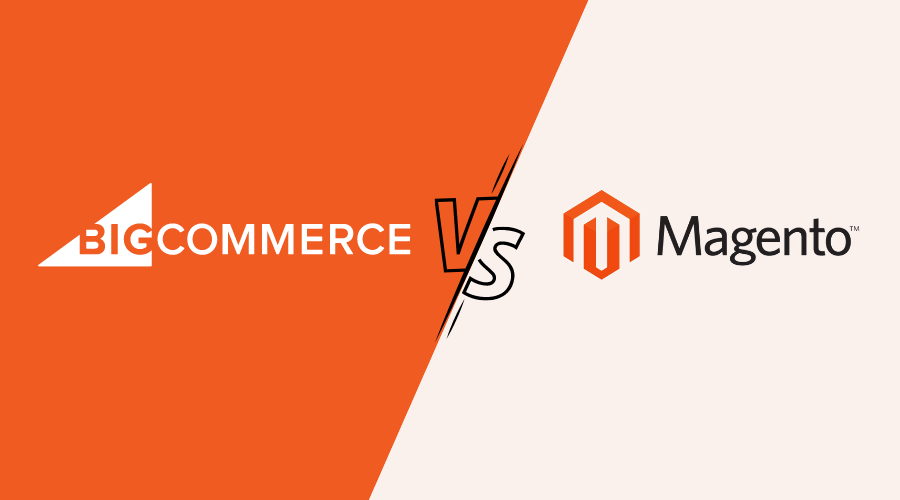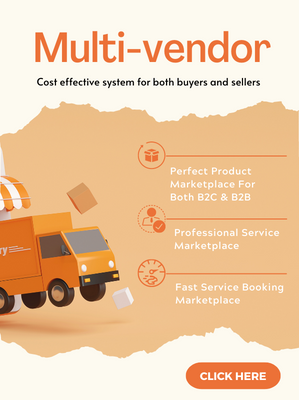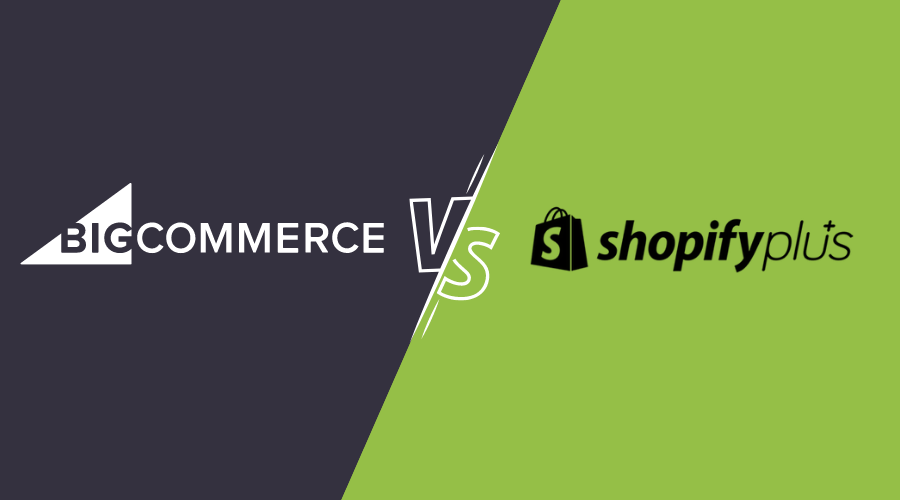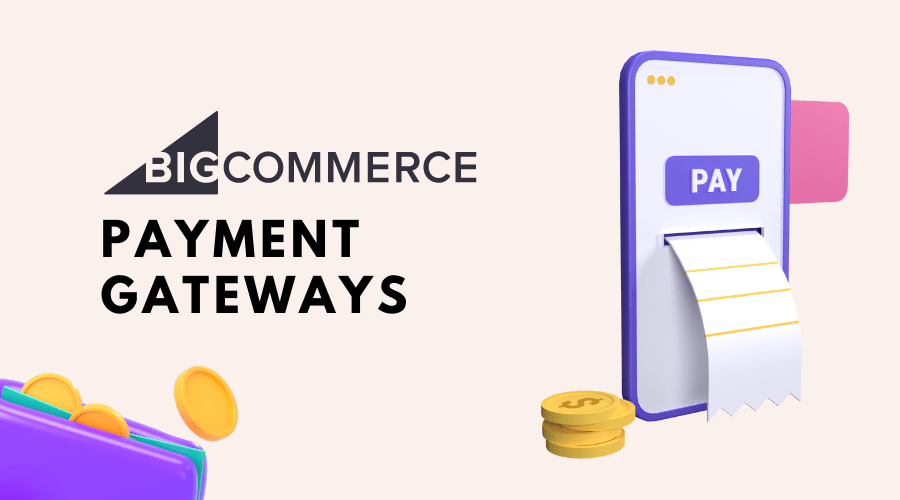The choice of an eCommerce platform involves many factors. Global retailers frequently use the eCommerce platforms Magento and BigCommerce. While Magento and BigCommerce are renowned for their broad functionality, Shopify and WooCommerce are not as well recognized for their abundance of built-in features. If you’re looking for a comparison between Magento or BigCommerce, this information will be beneficial to you.

BigCommerce vs Magento – Pricing
BigCommerce Pricing
| BigCommerce Plan | Cost Per Month | Sales Threshold |
| Standard | $29.95 | $50K |
| Plus | $79.95 | $180K |
| Pro | $299.95 | $400K |
| Enterprise | Must call for a quote | Call for Info |
Standard Plan: The starting monthly price for BigCommerce’s ‘Standard’ basic plan is $29.95. It offers every essential administrative and commercial function needed for a brand to launch fast and begin making sales.
Despite the seemingly low beginning price, there is a catch: each BigCommerce pricing plan has a minimum sales requirement for your yearly income. If your yearly income is more than the threshold for your current plan, you will be promoted. The goal of creating a new website is to boost sales, but in practice, BigCommerce penalizes you for your accomplishments.
Plus Plan – The Plus plan adds a few restricted marketing options to the Standard plan’s features to increase conversions. The minimum yearly income required for this plan is $180,000.
Pro Plan: The Pro plan gives all the features of the Plus plan as well as other features including scalability, user reviews, product filters, and so on. The limit on annual income is $400,000. However, if you go above the limit, the cost is different here. You will incur an additional $150 monthly expense for every extra $200,000 in sales income you generate beyond the limit.
Enterprise plan – BigCommerce’s website makes no mention of price for the Enterprise plan. To receive a personalized price depending on your sales income and other needs, you must get in touch with the sales staff. Only the Enterprise package offers the most crucial features you’ll want, such as a development environment, customized filters for huge catalogs, and specialized support to help you expand and solve problems more quickly.
Magento Pricing
There are three different versions of Magento: Magento Open Source, Magento Commerce (formerly Adobe Commerce), and Magento Commerce Cloud (Adobe Commerce Cloud).
It is free to use Magento Open Source. However, to tailor Magento to your company’s needs, you’ll need to work with a development company that is familiar with e-commerce and can adapt the platform to your target audience. You must also include in the fees of hosting ($10–50/month) and domain registration ($10–400/year).
Let’s now examine Magento Commerce and Magento Commerce Cloud, the two premium editions of the software.
| Companies with gross sales revenue | Magento 2 Commerce (Enterprise) | Magento 2 Commerce Cloud (Enterprise+AWS cloud) |
| 0 – $1 mil | $22,000.00 | $40,000.00 |
| $1 – $5 mil | $32,000.00 | $55,000.00 |
| $5 – $10 mil | $49,000.00 | $80,000.00 |
| $10 – $25 mil | $75,000.00 | $120,000.00 |
| $25 $50 mil | $125,000.00 | $190,000.00 |
The annual revenue-based licensing cost for Magento Commerce and Magento Commerce Cloud is displayed in the table above (the latter of which includes AWS hosting).
Note: For retailers that prefer the hosted Enterprise edition, Magento allows for negotiation of the license charge. As a result, depending on your needs, the setup cost of your Magento shop may vary.
As was already indicated, areas like customization, the creation of extensions, and custom themes (if you choose) will raise your overall price.
BigCommerce may serve as a rapid starting point for small enterprises who want to launch more quickly and on a tighter budget. The platform’s omnichannel capabilities, scalability, high security, and extensive list of out-of-the-box features make it justifiable even if Magento’s costs appear to be greater.
BigCommerce vs Magento – Security
BigCommerce Security
BigCommerce has strong anti-hacking protection built in. BigCommerce is a hosted platform that offers PCI compliance and is certified to the highest level of data security, ISO/IEC 27001. BigCommerce also offers security measures like firewalls, intrusion detection software, and many others.
Magento Security
Magento has a comprehensive set of strong security features and is PHP 7 compliant. For passwords, Magento offers SHA-256 (Secure Hash Algorithm 256), which protects your business against dictionary attacks. Composer, Zend Framework, Signifyd (a fraud prevention solution), and SSL Certification are further security alternatives.
Magento offers security fixes for earlier versions and enhances its security features, which keeps the Magento user community safe.
The built-in Security Scan Tool of Magento is another noteworthy feature. The following benefits of Magento’s Security Scan tool:
- Real-time security status monitoring
- Security updates to speed up problem resolution
- Keep track of earlier reports and progress
- More than 21,000 security checks are available to retailers.
- Report on failed tests and suggested remedies.

BigCommerce vs Magento – Scalability
BigCommerce – Scalability
BigCommerce has sufficient scalability, however the basic plan has few alternatives. You will need to pay extra for scalability or choose the “Enterprise” plan if you anticipate rapid expansion.
You may create original user experiences for customers using the platform’s Open API. JavaScript may be used to handle the shopping cart and checkout using the Storefront API. You may add shipping estimates, taxes, and more using the Order API.
However, you must have technical expertise to complete the task; else, you’ll have to pay developers to complete it for you.
Magento – Scalability
As we’ll see, Magento offers strong scalability, allowing you to customize your site to meet your current and future demands. For instance, Magento will meet your demands without issue whether you intend to increase your product portfolio, sell internationally, or create differentiation.
In its 2.x edition, Magento has significantly enhanced its scalability. Magento 2 can handle 2.1 million page visits per hour and 117 percent more orders. In terms of operations, Magento is able to support more concurrent admin users than Magento 1.
This indefinite scalability does not, however, come at the sacrifice of efficiency, since Magento 2 offers several performance enhancements over Magento 1 thanks to Adobe:
- Customers may check out 38% quicker.
- For guests, checkout occurs 51% faster
- Response time to add-to-cart requests is 66% quicker.
ElasticSearch, a fully integrated search engine that can be configured to deliver accurate search results more quickly, is also provided.
Your consumers will have a flawless website experience thanks to increased scalability and improved performance, and your conversion rate will increase.

BigCommerce vs Magento – Customization and flexibility
BigCommerce – Customization and flexibility
BigCommerce’s hosted platform limits your ability to tailor your store to suit certain requirements. It is challenging to modify the basic code to provide your own company requirements. BigCommerce includes necessary integrations like POS and marketplaces, but compared to Magento, the amount of third-party apps it supports is less.
Magento – Customization and flexibility
Magento offers unparalleled customization and adaptability in the industry. Because the platform is completely adaptable, you may add new features, modify the core code to fit your business logic and administrative needs, and design unique customer experiences.
With Magento, integrating external systems is simple. Everything interacts smoothly with the Magento backend, including marketing automation tools, ERP, CRM, payment gateways, and custom-built extensions. This makes it possible for store owners to make the most of both Magento’s and their preferred third-party system’s features.
BigCommerce vs Magento – SEO and Marketing

BigCommerce – SEO and Marketing
BigCommerce provides sufficient marketing tools to direct customers to your online business. Built-in SEO tools, social sharing, customer loyalty programs, consumer segmentation, and other features are just a few of the capabilities. You may also prepare email campaigns that are focused on branding and conversions.
Magento – SEO and Marketing
Numerous SEO capabilities are built into Magento by default. For the home, category, and cart pages in Magento, you may alter the page names. Additionally, you may change the anchor text for navigational links and utilize canonical URLs to prevent content duplication.
Developers may create unique pages to draw clients with the help of the intriguing Magento Page Builder tool. Store owners may notify search engines about the contents of their websites and obtain zero place in SERPs by utilizing features like rich snippets and XML sitemaps.
Key Google marketing and monitoring tools, such as Google Analytics, Privacy Settings, Content Experiments, and Tag Manager with Magento admin, are simple to combine with your Magento business.
By creating mobile web apps that load in under 3 seconds, Magento’s PWA studios helps you improve your mobile search engine results.
The marketing capabilities of Magento are enhanced by features like product suggestions, customer segmentation, and the ability to design, manage, and improvise email, digital, social media, and SMS campaigns.
If you’re a B2B retailer, you may use technologies for marketing automation like Marketo, a partner in technology with Magento.
BigCommerce vs Magento – Extensions and built-in tools
BigCommerce – Extensions and built-in tools
BigCommerce offers both free and paid extensions in its marketplace to increase the technical, management, and customer experience capabilities of your business. There are 600 applications accessible in its marketplace for you to pick from.
Magento – Extensions and built-in tools
Magento easily outnumbers BigCommerce in terms of the variety of extensions it offers. In its marketplace, Magento offers more than 5,800 free and paid extensions for marketing, checkout, fulfillment, inventory and order management, PIM, and other uses. Additionally, Magento offers comprehensive technical instructions for setting up and configuring these extensions.
Now, let’s take a look at the built-in tools that Magento provides to Open Source sites:
- ElasticSearch – Built-in search engine that can be customized based on your products for accuracy and faster search results.
- Multi-source Inventory – Multi-warehouse management system.
- Adobe Payment Service – Integrated payment gateway for Magento users (available with the latest version of Magento, 2.4.3).
- OMS – Order Management system to control and check inventory.
- MBI (Magento Business Intelligence) – To create well-targeted marketing strategies, advanced analytics tools may be used to extract valuable data from digital interactions.
BigCommerce vs Magento – Omnichannel
Both BigCommerce and Magento provide omnichannel support. Both platforms have built-in integration possibilities for additional digital sales channels, including POS (offline) and marketplace support.
You may combine your eCommerce business with marketplaces like Amazon and eBay using Magento. Magento provides simple native mobile app connection with the Magento backend for companies focused on mobile as a digital sales channel.
Magento takes your mobile experience to the next level. PWA Studio, an internally built PWA (Progressive Web App) SDK from Magento, enables you to create mobile web pages with an interface and experience akin to native apps.
Read also:
Bigcommerce payment gateways : The ultimate guide you need to know
Bigcommerce headless: The powerful solution for selling online
Conclusion
It is now obvious which platform is the superior overall choice after examining all the crucial aspects for selling online.
BigCommerce is less complex than Magento, although not being the world’s easiest software to use. There are all the tools in one location, and no coding experience is necessary.
You have a ton of design versatility with Magento because to its endless customizability. However, considering that you must write everything and connect to a server yourself, it requires far more technical expertise than BigCommerce.
Recap each round fast to see how we got here.
| Category | BigCommerce | Magento | Winner |
| Ease of Use |
Simple, although its language might be somewhat difficult at first! | Extremely challenging without any coding experience, and requires host integration. | BigCommerce |
| Pricing | There are three primary price tiers, ranging from $29.95 to $299.95 monthly. | Free to start, but hosting fees and fees for third-party programs can mount up. | BigCommerce |
| Design Flexibility | Offers 12 free templates that look amazing and are simple to edit, as well as many more expensive ones. | You have total creative freedom with unlimited modification, but you’ll need to know how to code, or at the very least have the money to pay someone to help. | BigCommerce |
| Ecommerce Tools and Features | Offers more integrated features than any other ecommerce platform available. | Although its built-in capabilities are limited, it does provide users access to more than 3,000 apps. | BigCommerce |
| Performance and Security | Provides a free SSL certificate across all of its plans, as well as a variety of commercial choices, and automatically installs security fixes for you. | An SSL certificate is not supplied as normal, and you will need to apply security updates yourself. | BigCommerce |
| Payment Options and Fees | Supports a variety of payment processors without costing you anything. | You may select from hundreds of payment interfaces, most of which will cost you money and effort. | BigCommerce |
| Marketing Tools and Features | Allows you to sell through several channels and adjust meta descriptions, URLs, and more. | Comes with several useful SEO features as standard, and app connectors for multi-channel selling are available. | Magento |
| Help and Support | Although it offers live chat and phone help around-the-clock, its knowledge base may be enhanced. | Has a sizable help center and a community forum. There isn’t, however, a 24-hour hotline. | Magento |
While Magento is great for tech-savvy business owners who don’t mind investing time (or money) in customizing their shop with code, BigCommerce is perfect for individuals who need to swiftly launch a large, rapidly expanding business online.
BigCommerce has all the resources needed to create a powerful e-commerce business and is relatively easy to use. Even if using Magento requires more time, the platform does allow for complete creative flexibility, which may appeal to perfectionists.
Anyone may use BigCommerce to build a store, while Magento is inappropriate for novices and is better suited for enterprises at the corporate level.
At Magesolution, we provide BigCommerce development services, which has helped numerous small, medium and large companies in building their own online stores. Thus, this is the high time for you to CONTACT US for a free quotation!



